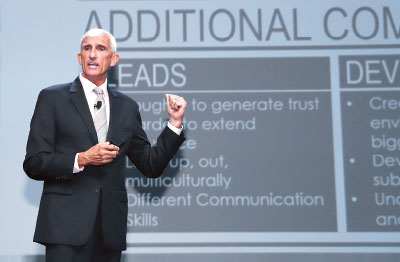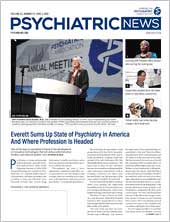“Purity and civility.”
Those are the values that leaders of the future will need to embody in an era when the standards of civil discourse are falling, said retired Lt. Gen. Mark Hertling in an address at the Opening Session of APA’s 2018 Annual Meeting last month. “We are becoming a much more divisive society,” Hertling said. He said that the professionals in our society need to “uphold values of purity and civility” at a time when civil discourse seems to be a lost value.
As commanding general of U.S. Army Europe, Hertling led over 50,000 soldiers, cared for over 100,000 family members, and partnered with the armies of 50 countries in the European theater. He was an assistant division commander in Baghdad in 2003-2004 and later commanded the Army’s 1st Armored Division in Germany and in northern Iraq during the surge. After his retirement, Hertling was appointed by President Barack Obama and served for four years as one of 25 members of the President’s Council on Fitness, Sport, and Nutrition. He is an adjunct scholar at West Point’s Modern War Institute and serves as a military analyst for CNN.
After leaving the Army in 2013, Hertling was hired as a senior vice president by Florida Hospital in Orlando to observe the culture of medicine there and help develop strategies for global partnering and leadership development. In an address he gave last fall at APA’s IPS: The Mental Health Services Conference, Hertling drew on the disciplines taught in the military and codified in the U.S. Army Leadership Field Manual emphasizing the relational aspects of leadership.
In his address at the Annual Meeting, Hertling said the skills of leadership—which are taught in the military as a discrete discipline—can be incorporated into medicine. “Leadership is the art of understanding motivations, influencing people, building teams, and communicating purpose in order to accomplish stated goals while improving the profession,” he said.
Leadership, as defined in the Army Doctrinal Manual, consists of three attributes—character, presence, and intellect. These are codified in a phrase that is taught to young recruits: “Be. Know. Do.”
“In essence, this means—Who are you? What kind of person are you? When you ask people about their career, they will go into their task accomplishments and skip over the most important part—what kind of person are you, and how do you carry yourself?”
Hertling said the competencies of a leader—the ability to inspire people, develop talent, and achieve goals—derive from the kind of person that he or she exemplifies. “The competencies of leadership come from who you are, not what you do.”
Following on the remarks of APA President-elect Altha Stewart, M.D., Hertling said leaders in medicine—as in other arenas—need to be culturally informed. “By the year 2030 we are going to have to be more culturally informed and understanding of people who don’t look and talk as we do,” he said. “If you look at our demographics, we are going to become more diverse as a society, not less.”
Leaders are going to have to “listen more and talk less,” he continued. And they will need to cultivate the young people in the profession. “You need to get into the weeds with your young people,” he said. “It isn’t always the case that mentorship is about an older, mature person mentoring the young, immature person—sometimes it’s the other way around.”
Finally, Hertling said the rising cost of health care is a problem that threatens the entire economy.
“There’s a lot of talk about President Trump’s budget and the amount that is allocated to the military,” Hertling said. “The military constitutes 3.7 percent of gross domestic product. Health care accounts for 19.8 percent and is estimated to rise to 22 percent by 2020. Health care is contributing most to bankruptcies and foreclosures. If the military has to get it right with a small percentage of the budget, you in medicine will need to look for leaders to take you in a new direction.” ■

